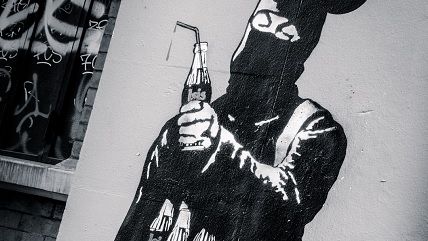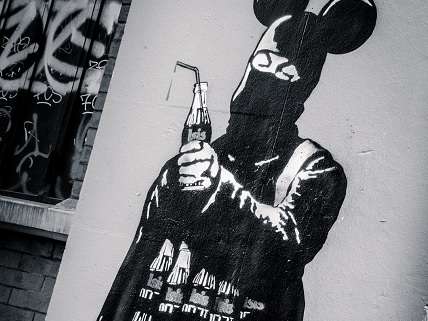France's 9/11 Could Lead to Another Ill-Advised War
Will history repeat itself?


After the terrorist attacks of September 11, 2001, President George W. Bush promised the U.S. would bring the perpetrators to justice and win a war on terror. On the night of 9/11, Bush made a statement from the Oval Office. "Terrorist attacks can shake the foundations of our biggest buildings," Bush said, "but they cannot touch the foundation of America."
Fourteen years, two land wars, multiple interventions, and a global network of surveillance later, there is more terrorism in the world and instability in the Middle East than there was in 2000. That another 9/11-style attack wouldn't be possible today is largely a function of cockpit doors being locked, and not any of the war on terror policies, foreign and domestic, with which the U.S. government has shook "the foundation of America."
On Friday, terrorist squads affiliated with ISIS carried out coordinated attacks across Paris that killed more than a hundred people and injured more than three hundred. Most of the alleged perpetrators who have been identified are nationals of European countries, mostly France itself. One of the terrorists reportedly came to Europe as a refugee from Syria—a passport indicating such was found at one of the sites but French authorities won't say if any fingerprints found match those of the refugee. Another of the terrorists, a French national, reportedly traveled to Syria in 2013 or 2014 to train with ISIS.
French President Francois Hollande called the attacks an act of war, promising France would be "merciless" and "unforgiving with the barbarians." France's war on ISIS pre-dates the terrorist attacks, while its intervention in Mali to battle Al-Qaeda affiliates trying to take over that country has been cited by some observers as a possible roadmap for the West's fight against ISIS.
On an interview that aired Thursday, President Barack Obama insisted ISIS had been "contained" by Western-led military action. He was pilloried for the comments after the Paris attacks, even though he was referring to containing ISIS geographically and had not ruled out their ability to launch a terrorist attack on foreign soil. Six years into his presidency, Obama ought to be better at choosing his words correctly. Nevertheless, he appears to be correct that ISIS has been contained geographically. It has less territory under its control than it did a year ago when it ran roughshod across the Iraqi army to drive deep into Sunni territory.
Part of the containment is a result of the sustained aerial and land campaign against ISIS, but part of it, as Oliver Roy notes in a column in The New York Times, is a result of ISIS hitting natural boundaries. Relatively strong states like Jordan and Turkey and disinterested populations like Iraq's Shi'ites make the second three hundred mile stretch of territorial conquest exponentially more difficult than the first stretch, from the ISIS capital of Raqqa in Syria to Mosul, Iraq's second city, which ISIS captured at the end of its run last year.
As Roy notes, these limits on the ground for ISIS could be driving it to get more involved in global terrorism, the path of least resistance to attention-grabbing headlines. Additionally, as Hollande demonstrated, launching terrorist attacks abroad can be a powerful tool for propaganda, recruitment, and, ultimately, control. ISIS is a terrorist group steeped in eschatological concerns. ISIS preaches that the end of the world is nigh, a popular refrain with fundamentalists (of the religious and political variety), and, more significantly, that it is a major player in bringing that apocalypse, and the final battle between good and evil that comes with it, to fruition.
France's bombing campaign provides optics for ISIS to further its recruitment and attempt to legitimize its control over the territory it does hold that no amount of oil revenue could've bought it. Including a Syrian refugee, or at least the passport of one, meanwhile, ensures a political backlash that ISIS can in turn use to radicalize those mentally unsound young Muslim men from which ISIS draws its foreign operatives. And if Europe stems the flow of refugees onto the continent as a response to the Paris attacks, they'll be doing a huge favor for ISIS, making it harder for tens of thousands of innocent people to flee the radical Islamist group's dominion, condemning them to ISIS' rule.
What can French airstrikes against ISIS accomplish? France says its hit strategic ISIS locations, but the group obviously expected some kind of military response to the Paris attacks. It's highly unlikely anything left around for France to hit is particularly high-value. France could put boots on the ground in an effort to exterminate ISIS. That plays into ISIS' end-game too. The Bush administration insisted America had to kill its enemies abroad, so its enemies wouldn't come here to kill Americans. "We fight them there so we don't have to fight them here." In practice, that means sending bodies to get killed there so they don't have to be killed here.
ISIS refers to the French and Germans as "Crusaders" even as the two countries are becoming increasingly less Christian ("post-Christian"). France has been one of, if not the strongest Western supporters of Palestinians in the United Nations, hardly the position of a Crusader nation. And while France has intervened militarily from Mali to Syria, Germany has not. Instead it's been the strongest voice in Europe for compassion for refugees, mostly Muslim, fleeing violence in the Middle East. European soldiers on the ground would give ISIS exactly what it wants, local "crusader" targets to kill and be "martyred" by and to use to gain recruits and legitimize its temporal power.
ISIS replaced Al Qaeda, weakened but not finished by fourteen years of American counterterrorist operations. By almost every measure, it is a more vicious organization even than Al Qaeda. This is not a new phenomenon—it is a well-known pattern wherever drug cartels and other crime lords (and what is a terrorist but that?) are knocked off. They are replaced by something more vicious.
In the wake of 9/11, the U.S. Congress passed an authorization for the use of military force against the perpetrators of the attack and associated forces. Al-Qaeda, which the U.S. blamed for the 9/11 attacks, didn't have many associated forces at the time. Today, they have affiliates across Africa and the Middle East. And they are in the fight of their life because of ISIS, which poses a more existential threat to them than the US ever did because it threatens to, and has already, replaced the group as the voice of radical Islamism. The leader of Al-Qaeda has condemned the leader of ISIS as the illegitimate leader of a phony caliphate. And yet, despite this, Hillary Clinton argues that the 9/11 authorization of the use of military force applies to operations against ISIS, an organization that didn't exist on 9/11 and whose average fighter is between 16 and 25 years old, or no older than 11 when 9/11 happened, no matter what their opinion of it was then or now.
There's no evidence France's war on terror will play out any differently from America's. Today, most Afghans may not even be aware what 9/11 was. It will be a lot easier for ISIS to convince residents of Iraq and Syria watching French bombs drop that the actions represent a renewed Crusade than to convince them it's to prevent any more French and Belgian nationals from perpetrating terrorist attacks for which ISIS could claim responsibility.


Show Comments (394)